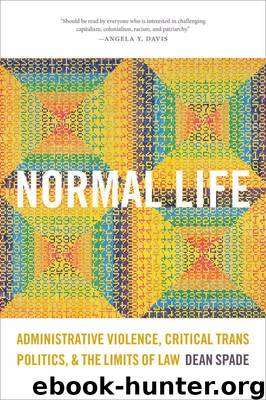Normal Life: Administrative Violence, Critical Trans Politics, and the Limits of Law by Spade Dean

Author:Spade, Dean [Spade, Dean]
Language: eng
Format: azw3, mobi, epub
ISBN: 9780822374794
Publisher: Duke University Press
Published: 2015-07-12T16:00:00+00:00
CONCLUSION
“THIS IS A PROTEST, NOT A PARADE!”
In 2005, TransJustice, an all-people of color trans organizing initiative at the Audre Lorde Project, organized and led the first annual New York City Trans Day of Action for Social and Economic Justice.1 Since its inception, the event has taken place on every Friday before New York City’s Pride weekend in June, with the Dyke March following on Saturday and the Pride Parade on Sunday. The Trans Day of Action brings together organizations and individuals from across the New York City area who are unified around a set of demands centered in racial, economic, and gender justice. The statement announcing the first Trans Day of Action provided a stark analysis of racialized-gendered state violence in the United States:
Gender policing has always been a part of the United States’ bloody history. State-sanctioned gender policing targets Trans and Gender Non-Conforming [TGNC] people first by dehumanizing our identities. It denies our basic rights to gender self-determination, and considers our bodies to be property of the state. Gender policing isolates TGNC people from our communities, many of which have been socialized with these oppressive definitions of gender. As a result, we all too often fall victim to verbal and physical violence. This transphobic violence is justified using medical theories and religious beliefs, and is perpetuated in order to preserve US heterosexist values.2
The statement goes on to identify many areas of concern, including the high unemployment rate of people of color, increased targeting of immigrants through Social Security and DMV policies, the failure of New York City’s anti-discrimination law to be implemented or enforced by the Commission on Human Rights, police brutality, and state-sanctioned mass murder of communities of color, as illustrated by the “blatant governmental negligence in the Gulf region during Hurricane Katrina.” The Trans Day of Action for Social and Economic Justice in New York City stands in profound contrast to many aspects of Pride celebrations around the United States and around the world. Such celebrations have been critiqued for their consumerist and patriotic themes; their marginalization of queer and trans people of color, low income people, immigrants, and people with disabilities; and their drift away from political resistance and toward entertainment and corporate sponsorship. Major corporate brands like Budweiser, TD Bank, Delta Airlines, Walgreens, and even oil companies sponsor pride celebrations around the world. In Edmonton, Alberta, protests arose in 2009 when the Edmonton Pride Parade was officially renamed the “TD Canada Trust Pride Parade and Celebration on the Square.”3
In 2013, controversy erupted when transgender military whistleblower Chelsea Manning was selected as an honorary marshal for San Francisco’s Pride parade. Promilitary gay and lesbian activists and service members protested Manning’s selection and it was ultimately revoked. The debate continued, and Manning was selected again and this time remained an honorary marshal in 2014’s San Francisco Pride. The controversy highlighted the ongoing tension between those who identify Pride as part of a queer and trans protest culture for a leftist movement for sexual and gender liberation, and
Download
Normal Life: Administrative Violence, Critical Trans Politics, and the Limits of Law by Spade Dean.mobi
Normal Life: Administrative Violence, Critical Trans Politics, and the Limits of Law by Spade Dean.epub
This site does not store any files on its server. We only index and link to content provided by other sites. Please contact the content providers to delete copyright contents if any and email us, we'll remove relevant links or contents immediately.
| African-American Studies | Asian American Studies |
| Disabled | Ethnic Studies |
| Hispanic American Studies | LGBT |
| Minority Studies | Native American Studies |
Cecilia; Or, Memoirs of an Heiress — Volume 1 by Fanny Burney(32558)
The Great Music City by Andrea Baker(32018)
Cecilia; Or, Memoirs of an Heiress — Volume 2 by Fanny Burney(31956)
Cecilia; Or, Memoirs of an Heiress — Volume 3 by Fanny Burney(31941)
We're Going to Need More Wine by Gabrielle Union(19046)
All the Missing Girls by Megan Miranda(16026)
Pimp by Iceberg Slim(14506)
For the Love of Europe by Rick Steves(14121)
Bombshells: Glamour Girls of a Lifetime by Sullivan Steve(14073)
Talking to Strangers by Malcolm Gladwell(13370)
Norse Mythology by Gaiman Neil(13363)
Fifty Shades Freed by E L James(13239)
Mindhunter: Inside the FBI's Elite Serial Crime Unit by John E. Douglas & Mark Olshaker(9341)
Crazy Rich Asians by Kevin Kwan(9291)
The Lost Art of Listening by Michael P. Nichols(7506)
Enlightenment Now: The Case for Reason, Science, Humanism, and Progress by Steven Pinker(7313)
The Four Agreements by Don Miguel Ruiz(6765)
Bad Blood by John Carreyrou(6621)
Weapons of Math Destruction by Cathy O'Neil(6279)
